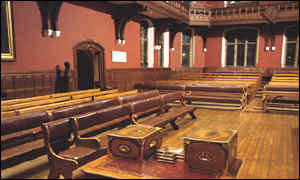 The Economist (Economist.Com) is sponsoring a series of debates on the future of education. Each debate topic considers the educational impacts of technology, globalization, and changing nature of social relationships. The third (and final) debate, which runs from from January 15th through January 25th, focuses on “social networking,” specifically on the proposition :
The Economist (Economist.Com) is sponsoring a series of debates on the future of education. Each debate topic considers the educational impacts of technology, globalization, and changing nature of social relationships. The third (and final) debate, which runs from from January 15th through January 25th, focuses on “social networking,” specifically on the proposition :
The debate is based on an online variant of the Oxford Debate rules – each speaker has three chances to advance his view – an opening statement, a rebuttal, and a final summary. Observers (who must register) may participate, mainly though a discussion with the moderator who will raise relevant points to the debaters. In addition, Observers may also vote for the side of the proposition they most agree with.
Speaking to the Affirmative: Ewan McIntosh, National Adviser on Learning and Technology Futures for Learning and Teaching Scotland. Mr McIntosh writes for The Guardian newspaper and the BBC on social media and learning issues, speaks internationally and consults for organisations on how social media can be harnessed for to improve learning in the organisation
Spealing to the Negative: Michael Bugeja, Director of Greenlee School of Journalism and Communication, ISU. Mr. ,Bugeja is the author of 21 books, with research often being cited by NYT and IHT to name a few, Dr Bugeja was among the first to analyse the use of Facebook before many professors realised that most of their students were already registered and of Second Life before many students had ever heard of it.
Moderator: Robert Cottrell, Deputy Editor of Economist.com. Mr Cottrell has been deputy editor of Economist.com for the past two years, and online editor of Intelligent Life magazine since its re-launch this year. He is based in New York.
Image source: BBC News, Ban Foxhunting? – Oxford Union says no, Thursday, October 22, 1998 Published at 20:23 GMT 21:23 UK. http://news.bbc.co.uk/2/hi/uk_news/198249.stm
